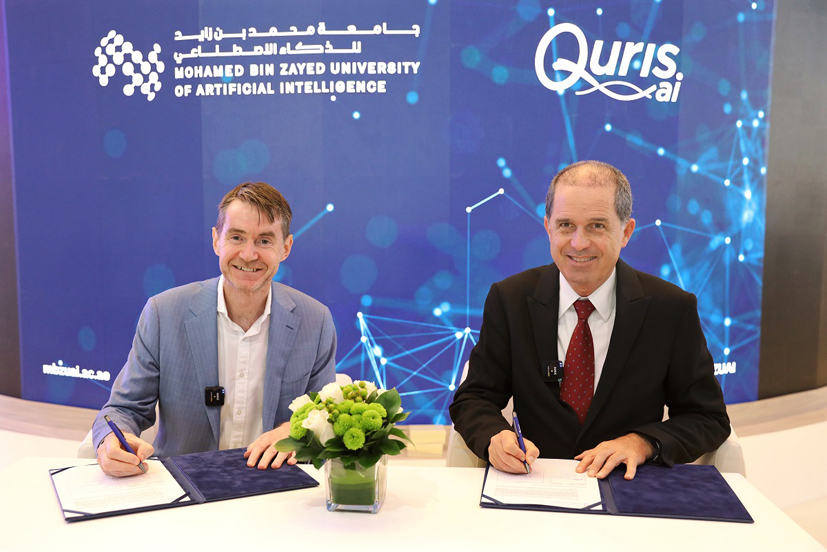Publiq Officially Arrives with a New Era of European Bistronomy in Dubai!
Quris-AI and MBZUAI to launch world-class Bio-AI center in Abu-Dhabi

Abu Dhabi-based collaboration to focus on accelerating the development of new personalized medications using AI
January , 2023, Abu Dhabi, UAE: Quris-AI and Mohamed bin Zayed University of Artificial Intelligence (MBZUAI) signed an agreement during Abu Dhabi Sustainability Week (ADSW) to develop a world-class Bio-AI center in Abu Dhabi. The state-of-the-art facility will support the development of personalized medications, tailored specifically to the diverse populations of the MENA region.
The collaboration will establish a center of excellence in Bio-AI in Abu Dhabi, which will accelerate the development of safer, and more highly personalized medications. MBZUAI provides expertise in the development of predictive AI models, while incentivizing sought-after AI graduates to stay in the UAE as they begin their careers.
Quris-AI, a pioneer in AI drug safety, developed the world’s first Bio-AI clinical prediction platform, which makes drug development faster and more efficient, and promises to save hundreds of millions of dollars in research and development costs. With this collaboration Quris, which has operations in Boston and Tel-Aviv, is now establishing its subsidiary, Quris-UAE in Abu-Dhabi.
Targeted drug development
Currently, around 90% of clinical trials for new medications end in failure, but Quris’ proprietary ‘patient-on-a-chip’ technology promises to reduce failure by predicting which drugs are most likely to work in humans. The Quris system rapidly performs test interactions using predictive AI technologies that simulate genetically diverse patients, eliminating the need for animal testing and avoiding the risk and cost associated with failed clinical trials.
“We are delighted to be collaborating with Mohamed bin Zayed University of Artificial Intelligence in Abu Dhabi, given its strong commitment to advancing AI and significant opportunities for synergy,” said Isaac Bentwich M.D., founder and CEO of Quris. “We salute the vision of H.H. Sheikh Mohamed bin Zayed Al Nahyan, championing the UAE to become a center of excellence in AI as a strong pillar of the economy, and we are honored to contribute to realizing this vision.”
Quris research operations are led by Nobel laureate, Professor Aaron Ciechanover, and by Moderna co-founder and former FDA Science Board Chair, Professor Robert Langer. Former Pfizer CEO Henry McKinnell now chairs the Quris Advisory Board alongside Dr. Kobi Richter, founder of world-leading companies Medinol and Orbotech. The MBZUAI team is led by Professor Eric Xing, MBZUAI President and University Professor, and co-principal investigator in the Quris-MBZUAI collaboration.
“One compelling aspect of my discussions with Professor Ciechanover and the Quris team have been about solving UAE-specific health problems faster and more cost-effectively,” Dr. Xing said. “The organelle systems being developed at Quris are a revolutionary platform for
high-throughput drug testing, which can be best served by a similarly high-throughput drug design pipeline using AI. Our unique capacities in computational biology and machine learning at MBZUAI will enhance Quris’ efforts to accelerate the development of new personalized and potentially life-saving medicines.”
As part of the collaboration, MBZUAI Deputy Department Chair and Associate Professor of Machine Learning Kun Zhang will drive a project titled: Disrupting Personalized Medicine using Patient-on-a-Chip and Causal Discovery. The project, which will draw on both organization’s resources and personnel, will accelerate discovery of personal, actionable causal effects on drug pharmacokinetics; genetic parameters with causal effect on drug metabolism; organ functional parameters relating to drug metabolism (e.g., liver/kidney/heart functional tests/assays); and ethnic-specific parameters affecting drug metabolism and safety. Additionally, the research will also support development of personalized (patient specific) drug administration protocol, as well as patient-on-a-chip method for causal discovery of patient specific treatments.

















